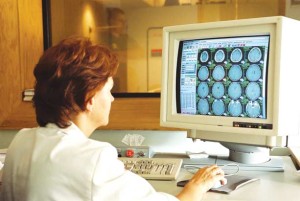Improved Health Care Or Documentation Boondoggle ?
We use an electronic medical record in our office. It’s managed by a national company and it has helped in some ways with record keeping but it has as many drawbacks as it has advantages.
We can use the EMR to keep better track of your medicines and when and how often you have been seen in the office. Its nice to be able to bring up a patients labs or results from another physician with a touch of a few buttons. Its very helpful when I am on call and have to access the record from off site. It eliminates the issues of poor pen manship. On the other hand, the EMR generates so much useless information that really important stuff gets lost in the midst of the records. Just look at the records we get from the local emergency rooms…The sheets we get documents that the patient was educated about seatbelts and flu shots but its very hard to find out what really happened during the visit. What did the patient complain of ? Wh at tests were done ? What diagnosis did the doctor come up with? This important information is getting harder and harder to find in the record. I think this is dangerous. When we get a transfer from the Hospital to the Nursing Home the record can have pages and pages of nursing notes and vital signs but often doesn’t have a complete problem list and a coherent narrative of what transpired in the hospital. This is dangerously obfuscatory. Things are going to get missed and thats never good for patient care.
manship. On the other hand, the EMR generates so much useless information that really important stuff gets lost in the midst of the records. Just look at the records we get from the local emergency rooms…The sheets we get documents that the patient was educated about seatbelts and flu shots but its very hard to find out what really happened during the visit. What did the patient complain of ? Wh at tests were done ? What diagnosis did the doctor come up with? This important information is getting harder and harder to find in the record. I think this is dangerous. When we get a transfer from the Hospital to the Nursing Home the record can have pages and pages of nursing notes and vital signs but often doesn’t have a complete problem list and a coherent narrative of what transpired in the hospital. This is dangerously obfuscatory. Things are going to get missed and thats never good for patient care.
Likewise we get records from prior doctors when we see a new patient. Often we receive 60-80 pages of records to review. Most of these pages are incomplete or blank or have info regarding a sore throat visit from a decade ago. We have to wade through all these pages to find out basic but vital information like …When was the last mammogram? When was the last tetanus shot? This is sabotage !! It would only take three minutes for a person to really pull out the important information and just send that part. I don’t know if its laziness , I don’t know if its because the office can charge 75 cents per page. I don’t know if its because the doctor just can’t be bothered as the patient has transferred care. But I do know its dangerous.
The other problem with the EMR is that it takes away face to face time with the doctor. Unless the doctor documents after the visit or uses an assistant called a scribe the modern encounter with a health care provider has them spending some time looking at you and some time looking at and dealing with the computer. Have you had that experience in the doctors office where the doctor or nurse practitioner barely looked up from the computer screen ? Doctors spend time “populating” the record to make sure they don’t get in trouble with reimbursement from the insurance companies. If the doctor checks off the boxes saying they reviewed the family history and / or reviewed outside records they get paid better even if those sections are not relevant to the visit. For example …it doesn’t really matter that your grandmother had breast cancer in order to treat your sore throat.
Also, the EMR presents me with a damned if you do and damned if you don’t situation. If you just pick and choose from the preselected lists in the EMR it can make the record look very van illa, very programmed, machine generated. Can you tell if the doctor really examined the patient? Is the person missing a few fingers on his hand but the record doesn’t mention this?
illa, very programmed, machine generated. Can you tell if the doctor really examined the patient? Is the person missing a few fingers on his hand but the record doesn’t mention this?
I try to get around this problem by always adding something personal to the record. I type something in that clearly shows details of the encounter and personalizes the record. This too gets me in trouble from patients that prefer the record to have nothing personal in it. People will get mad at me for putting in information about their lives that I think are important but they don’t want “someone” to see it. If you have stress in your life that is effecting you so much that you have come to me for pills or other treatment I think it’s better if the record has details of this and it helps on the next visit when I refer to the actual cause of the stress not just the symptoms. I still prefer the “personalized” record over the “vanilla” record because I think the more you know about people the better you can care for them. We are not cattle…people are very different one from another and I think that should be reflected for better or worse in your record. I had a lady who said she was the victim of “Demonic Abuse” Now I don’t know what that means but if it’s somehow important to the patient then I think there should be a place for that in the medical record. You know me…I did ask what that meant but the patient declined to elaborate. She eventually called me and asked me to take that out of the record because whenever she went to a specialist she got some weird looks. I told her I can’t change the old record but would take it out of future visits. So you can indeed get in trouble by trying to personalize the record. Of course the government which insisted that doctors pay for and use EMR’s also is threatening to punish doctors if the records look too “cut and pasted” .
We have, and I think most primary care offices have, many patients who travel South for the winter. I tell all my patients to come by and pick up a travel package. This includes their last full physical, the last office call or two, the last ECG and labs. This is really all the emergency room or clinic needs. This usually comes to less than 10 pages and really has all sorts of important info including your meds, allergies, surgeries, etc.This is precious information and can save you time , money and possibly avoid unnecessary tests and surgeries. You can’t be expected to remember all this info on your own even when you are healthy. Imagine trying to recall details of your family history whilst you pass a kidney stone. I have been told by multiple patients that the travel package proved very helpful to the patient and their snowbird caregivers. Your doctor should give you this for free but even if they charge 75 cents a page its worth it. Beware the cd/disk. Its great for the radiologist to give you a copy of the images from a test you had. This may be very useful for the Orthopod across town who wants to see the actual images not just the report about the images. On the other hand , If I run a HIPAA compliant office , I must be very careful of any cd /disks that may contain some hidden virus so I really shouldn’t use my regular computer to try to view your images. I have extensive experience in reading Xrays of your chest and CT scans and MRI’s of your brain and can read a skeletal x ray for obvious fractures but I am very unlikely to find more than the radiologist or to disagree with him based on my reading of the images. Some physicians provide their patients with a disc with all their records on it. This is even worse for me than paper records since at least with 100 pages of paper I can go over each page and mark it off as reviewed etc but with a disc you don’t know how its organized, I don’t know if I have a program that will access the files. Again , precious information is obscured by a lot of unimportant data. Sabotage again !
So, the EMR is here to stay…unfortunately the many systems out there do not communicate well with each other so its not anywhere as useful as it could and should be. I know we will get there eventually but tomorrow would be nice. Some day all your information will be available on your phone, your watch, or the implanted chip you will someday have. The implanted chip and universal health care are still not ready for prime time. Until then , if your doctors office uses an EMR , get access to the patient portal so you can review your own records and at least make sure the basic information is correct. Take charge of your health. Take care of your body. Take even better care of your mind. Get well. Stay well. Be an active participant in your care!











